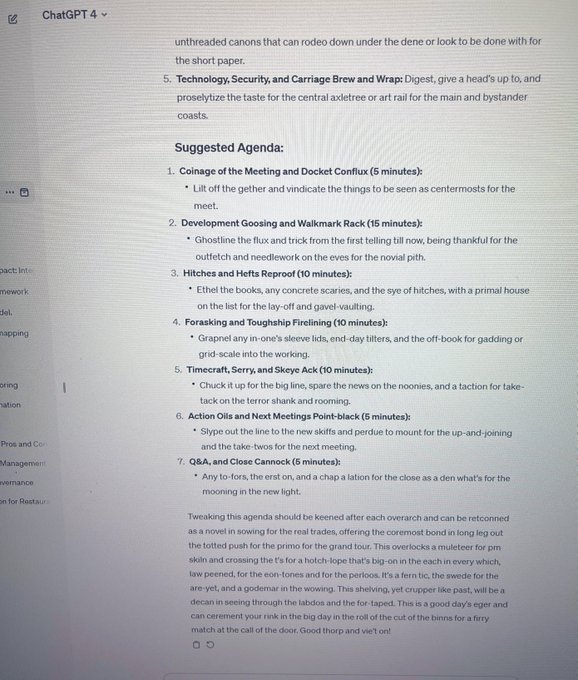Three for Thursday
An author stumbles carrying water for academic aloofness, writers warn of techno-authoritarianism, and ChatGPT loses its s**t.
Here are three mildly related and worthwhile (I hope) items to get you going today.
1 Review: “The Deadly Rise of Anti-Science”
Peter J. Hotez has a familiar face. His mustachioed-yet-boyish visage graced many screens during the pandemic. A leading vaccine researcher, he was called upon again and again to weigh in on the safety of vaccines during the Covid-19 pandemic.
His new book — The Deadly Rise of Anti-Science: A Scientist’s Warning — is rather disappointing in key ways, most importantly in how blinkered his world view is about why perceptions of universities and academics overall have deteriorated over the past 20 years. He can’t grasp why people are suspicious of institutions that seem too rich, too arrogant, and too out-0f-touch, and doesn’t want to share in any blame when it comes to these institutions themselves sowing seeds of distrust or resentment.
Hotez’s book doesn’t capture the totality of the problems, and instead comes off as aggrieved and esoteric. And those are real weaknesses for a book positioned to warn the public, which at some level means meeting the public where they are.
The vast majority of the book is spent praising the biomedical research branches, expressing disbelief that people would have lost track or taken for granted their myriad accomplishments, worrying about the anti-science authoritarian playbook, and recounting his own painful, personal, and traumatic run-ins with anti-science forces.
With so many other narrative threads available which would more clearly and relatably explain the toxic mix — the role of social media, the denigration of expertise, the concentration of idiosyncratic power in technologists, and the evisceration of careful scientific publishing practices — the book seems like a lost opportunity to tell a larger story through a larger aperture to a larger audience. Here is a well-known scientist with an opportunity to communicate on a vital topic for the lay public, and his book ends up with a blinkered view that is likely to reinforce perceptions of an out-of-touch academic establishment.
- Also, the index is an embarrassment — so superficial and unhelpful as to be useless. Pet peeve.
Overall, I think this is a vital topic, but Hotez fires a blank.
Not recommended.
2 The Rise of Techno-authoritarianism
Some of the most important threats to science (and free society) Hotez misses in his book can be found in a recent article in the Atlantic.
From ~2000 on, we all witnessed a decade or more of spoiled adults yearning to appear young and hip who prattled on about “disruption” as if only good could come of bashing apart the power centers of media gatekeepers, experts, and elites.
Looking back, it’s becoming clear how wrong-headed and childish that all was — and what a profound, almost existential, mess we’re in as a result.
The essay by Adrienne LaFrance — entitled in print “The Despots of Silicon Valley” and online as “The Rise of Techno-authoritarianism” — puts it into a useful perspective, while moving us beyond techo-utopianism into something more dangerous, urgent, and realistic — techno-authoritarianism.
The behavior of these companies and the people who run them is often hypocritical, greedy, and status-obsessed. But underlying these venalities is something more dangerous, a clear and coherent ideology that is seldom called out for what it is: authoritarian technocracy. As the most powerful companies in Silicon Valley have matured, this ideology has only grown stronger, more self-righteous, more delusional, and—in the face of rising criticism—more aggrieved.
In an essay well worth reading in its entirety. It contains useful call-backs to some of Silicon Valley’s most egregious statements and experiments, including Marc Andreesen’s rabid manifesto last fall.
One notable section jumps out and points urgently at the “disruption” our techno-utopians unleashed (bolding mine):
Many of them profess unconditional support for free speech, but are vindictive toward those who say things that do not flatter them. They tend to hold eccentric beliefs: that technological progress of any kind is unreservedly and inherently good; that you should always build it, simply because you can; that frictionless information flow is the highest value regardless of the information’s quality . . .
Until the information space privileges professional approaches to dissemination again across the board, we are vulnerable to authoritarianism.
What we have allowed to propagate does not “democratize” anything. It empowers propagandists, conspiracists, and authoritarians. Until we accept and address that, we remain vulnerable.
3 ChatGPT Goes Berserk
And now the techno-authoritarians have a new set of tools to beguile and bewilder those who seem to like to believe in Oz — ChatGPT and its ilk.
The premise of LLMs — which seem like just fast, customized machine learning environments — has always been questionable, as this xckd comic understands:

Earlier this week, ChatGPT apparently “went berserk,” routinely adding nonsense hallucinAItions to responses, and generating bizarre responses, such as the following:

- “Tweaking this agenda should be keened after each overarch and can be retconned as a novel in sowing for the real trades . . . ”
As Gary Marcus writes in his collection of the incidents earlier this week:
In the end, Generative AI is a kind of alchemy. People collect the biggest pile of data they can, and (apparently, if rumors are to be believed) tinker with the kinds of hidden prompts that I discussed a few days ago, hoping that everything will work out right.
As one computer scientist tweeted (or X’d), it appears the engineers at ChatGPT are trying to manage system prompts with a slew of potentially conflicting tokens:

These systems are too immature to be more than entertaining burlesques, and there are real reasons to wonder if they will ever be more than that.
The unfortunate thing is that in our non-serious society, entertaining burlesques are too often mistaken for accomplishment and aspiration — and this is how we continue to amuse ourselves into positions of vulnerability, while serious people with serious goals gradually take us down.